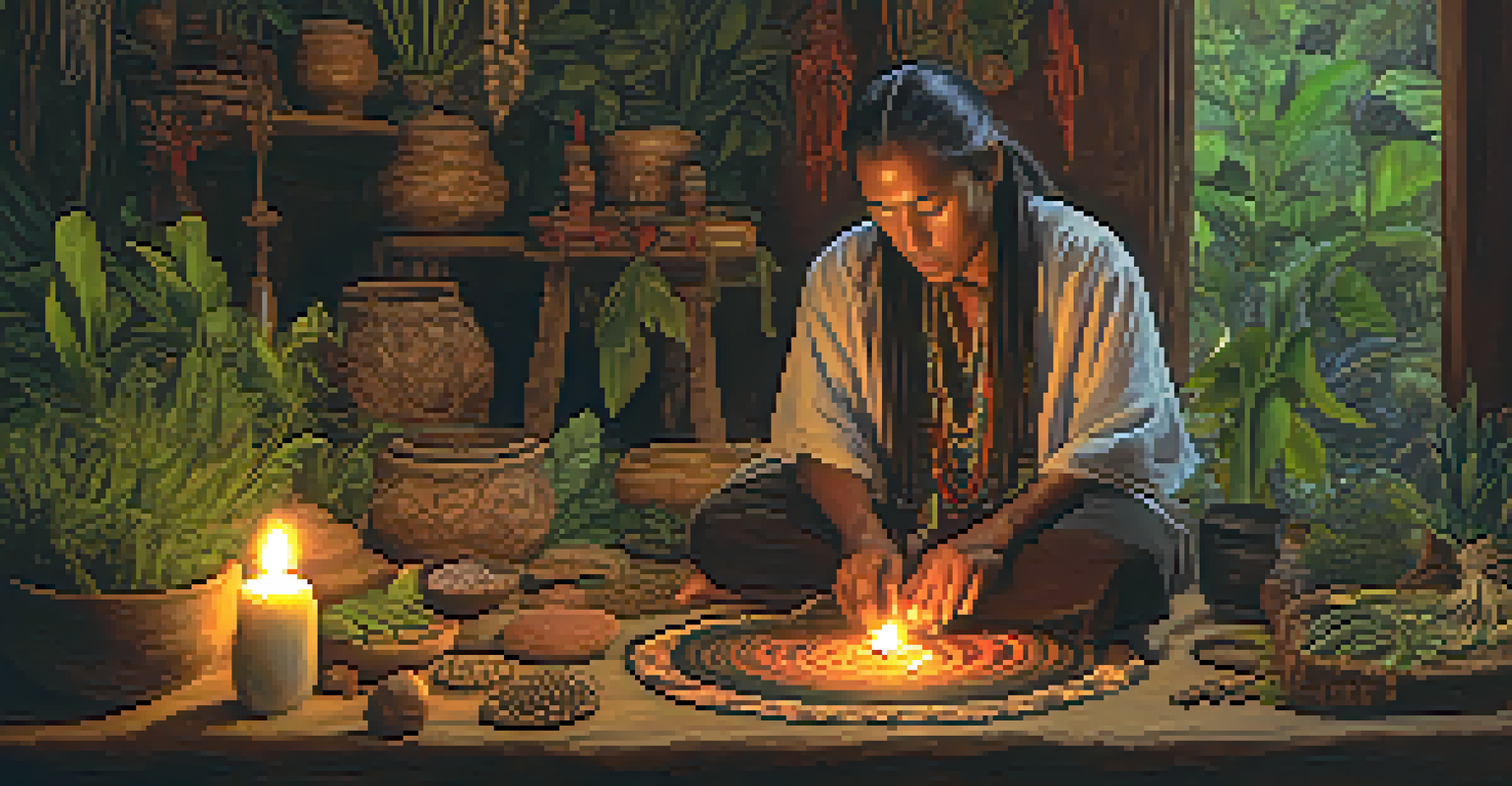Cultural Appropriation in Ayahuasca Retreats: A Critical Look

Understanding Cultural Appropriation in the Context of Ayahuasca
Cultural appropriation refers to the adoption of elements from one culture by members of another culture, often without permission or understanding. In the context of ayahuasca retreats, this involves Westerners participating in sacred rituals that originate from indigenous Amazonian cultures. It's crucial to recognize that these practices are deeply rooted in spiritual significance and community identity, making their appropriation a sensitive issue.
Culture is like a tree, it grows and evolves, but its roots must be respected.
Many participants may view ayahuasca as a means for personal transformation or adventure, while overlooking its cultural roots. This disconnect can lead to a commodification of the experience, reducing it to a mere trend rather than respecting its profound significance. By failing to acknowledge the origins of these practices, individuals risk perpetuating harmful stereotypes and exploiting marginalized communities.
Ultimately, understanding cultural appropriation in ayahuasca retreats requires a nuanced approach that respects and honors the traditions of indigenous peoples. Engaging with these practices mindfully can lead to deeper insights and a more respectful experience, fostering a genuine connection rather than a transactional one.
The Role of Indigenous Knowledge and Spiritual Practices
Indigenous knowledge encompasses the beliefs, practices, and wisdom developed by local cultures over centuries. In ayahuasca rituals, this knowledge is often passed down through generations, ensuring that the spiritual and healing properties of the plant are respected and understood. When outsiders participate in these ceremonies, they should be aware of the rich heritage and the painstaking processes involved in these traditions.

Many indigenous shamans, or curanderos, possess extensive training and experience in navigating the complexities of the ayahuasca experience. Their role is not only to administer the brew but also to provide guidance and support during the often-intense journey. This expertise is vital for safety and authenticity, and it can be undermined when these practices are commercialized or misrepresented.
Cultural Appropriation Awareness
Understanding the significance of ayahuasca rituals is vital to prevent commodification and respect indigenous cultures.
Recognizing the importance of indigenous knowledge encourages respect for the cultural context of ayahuasca. This respect can manifest in various ways, such as engaging with local communities, supporting their initiatives, or simply acknowledging their contributions to the spiritual landscape surrounding ayahuasca use.
The Commercialization of Ayahuasca Retreats
In recent years, ayahuasca retreats have surged in popularity, particularly among tourists seeking spiritual experiences. This rise has led to a booming industry that often prioritizes profit over cultural respect. Many retreat centers may market themselves as authentic, yet operate without genuine connections to the indigenous communities whose traditions they are borrowing.
The greatest threat to our planet is the belief that someone else will save it.
The commercialization of ayahuasca can dilute the authenticity of the experience, transforming it from a sacred ritual into an exotic getaway. This shift risks oversimplifying complex spiritual practices, turning them into mere commodities. Such a trend not only disrespects the original intent of these rituals but also can lead to negative consequences for both participants and the indigenous cultures involved.
To combat this trend, it's essential for potential participants to research and seek out retreats that prioritize ethical practices and genuine connections to indigenous communities. By supporting responsible tourism, individuals can help ensure that the spiritual and cultural significance of ayahuasca is preserved.
Effects of Cultural Appropriation on Indigenous Communities
Cultural appropriation can have damaging effects on the very communities from which practices are borrowed. For indigenous peoples, observing their sacred rituals being commercialized or misrepresented can feel like a violation of their identity and heritage. This can lead to a sense of loss and disconnection from their cultural roots, which are often already threatened by globalization.
Moreover, the influx of outsiders can disrupt local ecosystems and communities, as demand for ayahuasca retreats may lead to overexploitation of natural resources. This exploitation can further marginalize indigenous peoples, as they often lack a voice in the decisions that affect their lands and traditions. As a result, the very cultures that have nurtured ayahuasca for centuries may find their practices trivialized and their rights overlooked.
Support Indigenous Practices
Choosing ethically-led retreats ensures that indigenous communities benefit directly from the tourism surrounding ayahuasca.
Recognizing these impacts is crucial for fostering a more ethical approach to ayahuasca retreats. By supporting indigenous-led initiatives and advocating for their rights, participants can contribute to the preservation of cultural heritage while enjoying their experiences responsibly.
Navigating Ethical Participation in Ayahuasca Retreats
For those interested in participating in ayahuasca retreats, approaching the experience ethically is vital. This involves doing thorough research to ensure that the retreat is led by qualified indigenous practitioners who respect their traditions. Engaging with these communities on their terms can foster a more authentic and respectful experience, allowing participants to appreciate the spiritual depth of the practice.
Additionally, participants should consider the financial aspects of their involvement. Supporting indigenous-led retreats ensures that a portion of the fees goes directly back to the communities rather than to profit-driven enterprises. This not only helps sustain traditional practices but also empowers local populations to maintain their cultural identity.
Ultimately, ethical participation requires a mindset of humility and openness. By recognizing the wisdom embedded in these traditions and approaching them with respect, participants can cultivate a meaningful connection that honors both the experience and its origins.
The Importance of Cultural Sensitivity and Awareness
Cultural sensitivity is the awareness and respect for the beliefs and practices of different cultures, particularly marginalized ones. In the context of ayahuasca retreats, this means understanding the historical and spiritual significance of the practice and approaching it with an open heart and mind. Developing cultural sensitivity can lead to deeper, more enriching experiences that honor the roots of the tradition.
Awareness can also help participants navigate potential pitfalls when engaging with ayahuasca. Being mindful of the cultural context can prevent misunderstandings and promote respectful interactions with local communities. This awareness can enrich the experience, allowing participants to engage meaningfully with the rituals and the people involved.
Foster Cultural Sensitivity
Cultivating cultural sensitivity enhances the experience and promotes mutual respect between participants and indigenous peoples.
Cultivating cultural sensitivity is not just beneficial for the individual; it can also foster a spirit of collaboration and mutual respect. By actively seeking to understand and honor the traditions of others, participants can contribute to a more harmonious and respectful exchange between cultures.
Conclusion: A Call for Respect and Authenticity
As the popularity of ayahuasca retreats continues to grow, it is essential to engage with these practices responsibly and respectfully. Acknowledging the complexities surrounding cultural appropriation allows for a deeper understanding of both the spiritual significance of ayahuasca and the indigenous cultures that have nurtured it. By prioritizing respect and authenticity, participants can foster a more enriching experience for themselves and the communities involved.
Encouraging ethical tourism and supporting indigenous voices is crucial for the preservation of these sacred practices. This not only benefits the participants but also empowers indigenous communities to share their traditions on their own terms. Ultimately, a mindful approach to ayahuasca retreats can create a more equitable exchange that honors the rich tapestry of cultural heritage.

In conclusion, as we explore the depths of spiritual practices like ayahuasca, let us do so with an attitude of respect, humility, and genuine curiosity. By acknowledging the roots of these traditions, we can ensure that the journey is one of growth and connection rather than appropriation and exploitation.